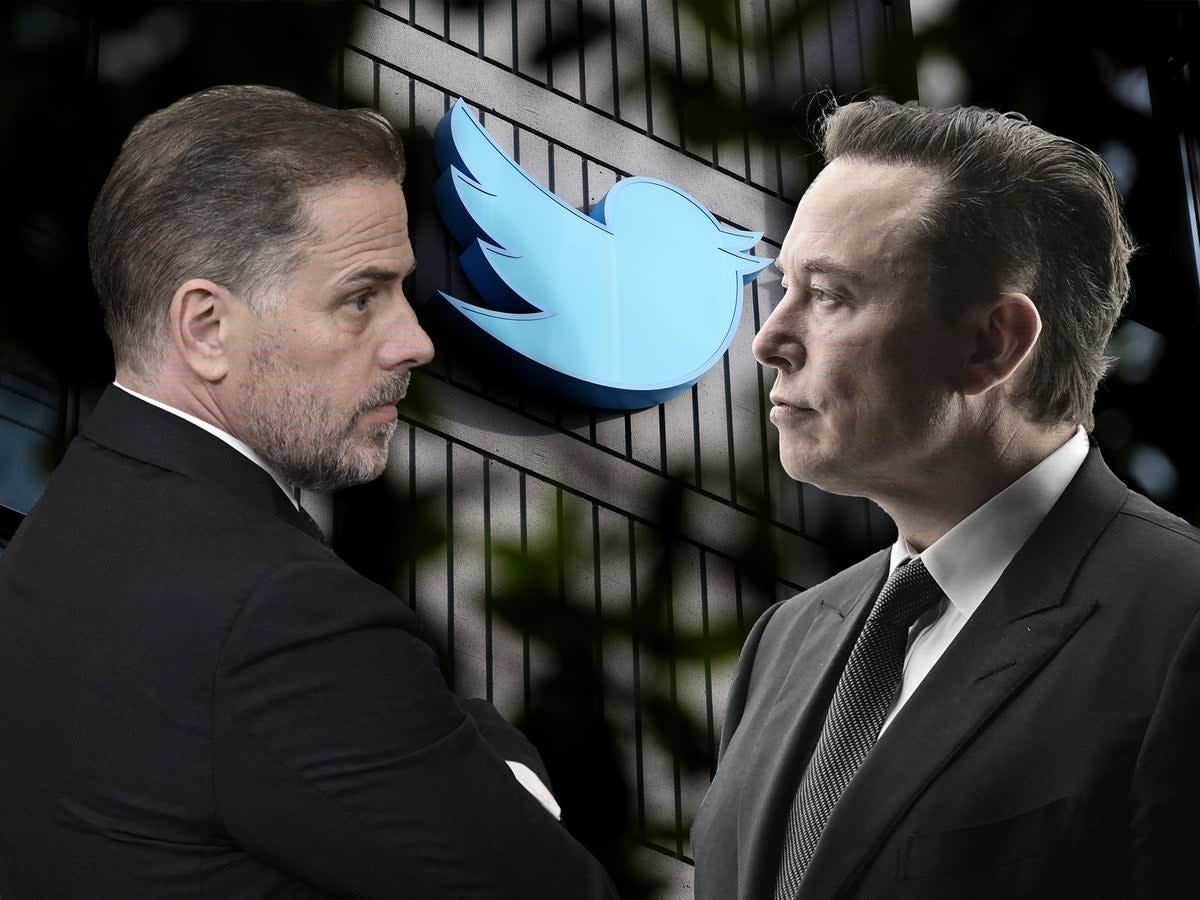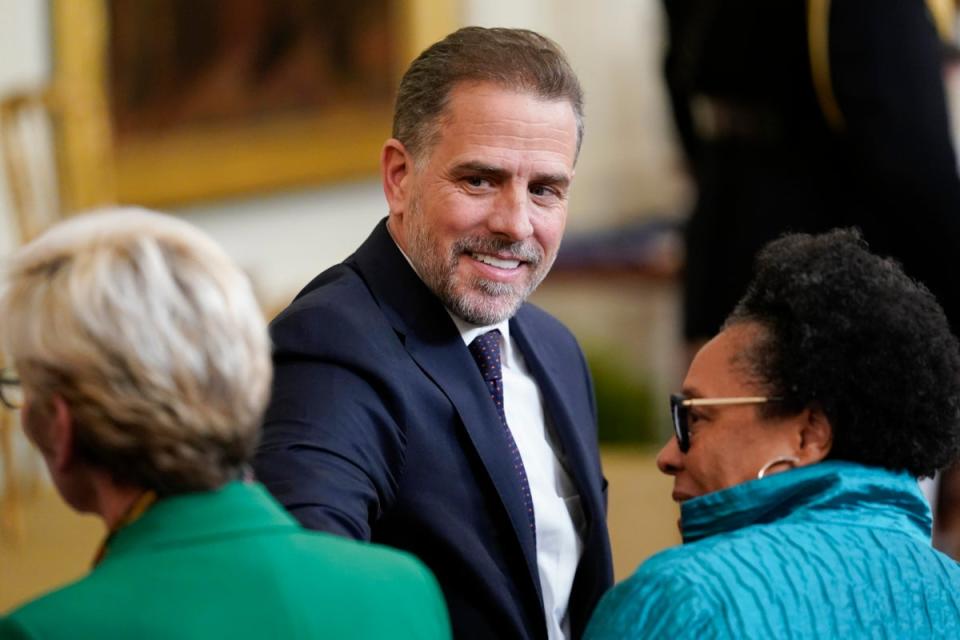The truth of Twitter’s role in the Hunter Biden laptop story and it’s not what you think

Recently minted Twitter owner Elon Musk says the company’s prior management team’s work liaising with political campaigns and the US government amounted to an egregious violation of the US Constitution’s freedom of speech guarantees.
Former president Donald Trump says the company’s October 2020 decision to temporarily restrict sharing of an unflattering story about Joe Biden and his son Hunter Biden proves the last presidential election (which he lost) was tainted by “massive and widespread fraud and deception” that should be remedied by “termination” of the US Constitution and reinstating him as president.
But national security experts and former social media executives who spoke to The Independent in the days following Mr Musk’s leaking of internal company documents to a sympathetic former Rolling Stone journalist say the limited excerpts of the documents revealed in a lengthy Twitter thread late Friday show nothing out of the ordinary — and nothing even close to what Mr Musk alleges.
The Tesla and SpaceX executive turned social media impresario had spent days hyping what he had dubbed the “Twitter Files” on the site he purchased in late October. In responses to a succession of right-wing media figures and pro-Trump trolls, he suggested the previous management team at Twitter had implemented policies aimed at suppressing speech from conservatives as a way of helping elect Democrats to high office.
Specifically, Mr Musk has echoed claims from prominent Trump supporters who have suggested that Twitter’s decision to block distribution of an October 2020 New York Post story concerning an email purportedly from an abandoned laptop belonging to President Joe Biden’s son, Hunter Biden, was either done at the behest of the Federal Bureau of Investigation or as a way of stopping an unflattering narrative about the Bidens from taking hold with weeks to go before the 2020 election.
Yet even Taibbi, a once-celebrated magazine writer who left Rolling Stone to start a newsletter on Substack in April 2020, admitted that the former possibility isn’t supported by what he’s seen so far, writing: “Although several sources recalled hearing about a ‘general’ warning from federal law enforcement that summer about possible foreign hacks, there’s no evidence - that I've seen - of any government involvement in the laptop story.”
22. Although several sources recalled hearing about a “general” warning from federal law enforcement that summer about possible foreign hacks, there’s no evidence - that I've seen - of any government involvement in the laptop story. In fact, that might have been the problem...
— Matt Taibbi (@mtaibbi) December 3, 2022
Instead, document excerpts he posted show Twitter executives unsure of how to handle the Post story, even after the site blocked users from sharing it under the company’s policy prohibiting distribution of hacked or stolen materials.
At the same time, however, conservatives have seized on the involvement of the company’s deputy general counsel, James Baker, as evidence of FBI-related shenanigans, pointing to Mr Baker’s former role as the Bureau’s general counsel at a time when the FBI was probing alleged links between Mr Trump’s 2016 campaign and Russia’s efforts to interfere on that election on his behalf.
Some in the GOP have also pointed to an affidavit filed with the Federal Election Commission by Yoel Roth, the former head of Twitter’s “Site Integrity Team,” stating that he’d participated in “regular meetings with the Office of the Director of National Intelligence, the Department of Homeland Security, the FBI, and industry peers regarding election security” as proof that Twitter’s decision to block sharing of the Post story was done at the behest of the FBI.
Others, including Missouri Attorney General (and Senator-elect) Eric Schmitt, have pointed to work by a senior special agent in the FBI’s San Francisco field office called Elvis Chan as evidence of the same.

On Friday, hours before Taibbi began posting tweets about the documents Mr Musk had given him, Mr Schmitt wrote that Mr Chan had testified in a deposition about “weekly” meetings in which he “personally told the social media companies that there could potentially be a Russian ‘hack and leak’ operation shortly before the election.
Like Taibbi, Mr Musk, and other pro-Trump Republicans, Mr Schmitt has sought to portray the Bureau’s contact with social media companies as censorious, out of character with the law enforcement agency’s usual practices, and a deliberate attempt by so-called “deep state” actors to put thumbs on the scales for Mr Biden in the most recent presidential election.
But Katie Harbath, a former top Facebook public policy executive who previously served in senior roles at the Republican National Committee, the National Republican Senatorial Committee, and other Republican campaigns, told The Independent that the social media companies’ work with federal law enforcement had less to do with 2020 than it did with what had happened four years earlier, when Russian government hackers were able to dump huge caches of stolen emails from the Democratic National Committee and top Hillary Clinton campaign officials onto social media sites.
“A lot of it came out of criticism following 2016 that there wasn’t enough collaboration,” she said when reached by Twitter direct message.
She later added that what Mr Musk, Taibbi, and others have “described as collusion” was in fact “more an effort to avoid being used by foreign influence ops”.
The former law enforcement officials who spoke to The Independent for this story concurred with Ms Harbath’s assessment of what had transpired in the run-up to the 2020 election.
Peter Strzok, a former FBI Counterintelligence Division deputy assistant director who led the Bureau’s probes into Hillary Clinton’s use of private email and Russia’s interference in the 2016 election, said the FBI and the entire US intelligence community had “dropped the ball” by being too slow to understand how Russia had used social media in 2015 and 2016.
He said part of the government’s efforts to avoid a repeat of those mistakes was to have a “responsible conversation” with tech companies about malign actors’ use of their platforms going forward.
“The government doesn't want to give up classified information. Private industry, particularly the tech industry, and particularly social media companies, don't want to be seen as … doing the government's bidding or being in bed with the government. But there's a space for responsible dialogue for all these folks to exchange information,” he said.

Mr Strzok said the “entire reason” this ongoing dialogue is even an issue is because of “the perception on the right, that somehow this is damaging to their candidates”.
“The fact of the matter is, Russia was trying to help get Trump elected,” he said. “Sorry, they weren't trying to get Clinton elected. They weren't trying to get Biden elected. It's just the way it is”.
One ex-senior FBI official who asked for anonymity to speak more candidly said the weekly meetings alluded to by Mr Roth and Mr Chan would only be the tip of the iceberg.
The former special agent explained that it is not at all unusual for there to be “regular contact” between law enforcement and platforms for risk assessment purposes.
They also said it would be highly unusual if a given day were to go by without any contact between the two sides, and compared the meetings between Twitter, Facebook and other companies with the bureau to the defensive briefings that are sometimes provided to political candidates.
Frank Figliuzzi, a former FBI executive who once headed the Bureau’s counterintelligence division, told The Independent in a phone interview that agents would have been derelict in their duty had they not had ongoing conversations with Twitter executives about the possibility of malign foreign actors making use of their platform for information operations, including a 2016-style hack-and-leak.
Mr Figliuzzi cast doubt on claims that the FBI — or any government agency — told Twitter or any social media platform that the information attributed to the alleged Hunter Biden laptop (which The Independent has not reviewed) was definitively Russian disinformation.
Instead, he explained that agents would have only given warnings in general terms based on intelligence showing that Russia (or another foreign state) had plans to execute a propaganda campaign involving the alleged Biden documents. He also noted that the consequences would be far worse if the FBI didn’t make any attempt to warn of such efforts beforehand.
“They know what they know through extremely sensitive sources and methods, so it's quite likely they didn't go to Twitter and say: ‘Hey, let me show you all that top secret intercepts we have showing this propaganda campaign coming out of the Kremlin,’” he said.
“They just gave Twitter a subtle heads up, and that's it — that's what happens all the time. It's not censoring. It's not telling the private company what to do or not to do. It's just trying to protect the American public and being burned if you don't do it”.


